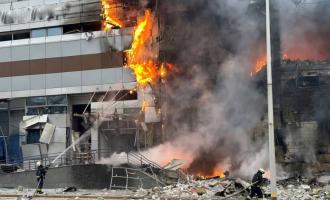Yesterday's news of the assassination of Hamas leader Saleh al-Arouri in Lebanon may not have been a "bolt from the blue" for those who have been following developments in the Middle East over the years, but it marked a new phase in the Israel-Hamas war, since it went beyond the borders of the Gaza Strip.
Al-Arouri, in addition to being a leading Hamas figure, was also its chief liaison with the Lebanese Hezbollah organization and its Iranian protectors and thus played a key role in coordinating Hamas-Hezbollah actions against Israel.
This individual was at the top of Israel's hit list even before the bloody Hamas attack last October.
The assassination of Hamas leader al-Arouri in Lebanon and statements by Israeli officials
International media reports that "The vague statements issued by Israeli officials in response to the news of al-Arouri's assassination did nothing to dispel the widely held view that Israeli intelligence was behind the assassination," noting:
"Led by its foreign intelligence agency, Mossad, Israel's intelligence services have a long history of extrajudicial killings. In his book Rise and Kill First, Israeli investigative journalist Ronen Bergman discusses in detail the history of these assassinations, which predate the post-war establishment of the state of Israel.
Bergman's data-rich research reveals that Israeli intelligence agencies have carried out some 2,700 extrajudicial killings in their history, more than any Western state.
Given such a prolific history of targeted assassinations, the killing of al-Arouri in Beirut can be described as both expected and unremarkable.
Indeed, Israeli officials have repeatedly stated since October 7 that Hamas' senior leadership will be targeted globally. In a leaked recording last month, Ronen Bar, director of the Israeli Security Agency, was heard announcing to members of Israel's Knesset that senior Hamas leadership would be targeted "in Gaza, in the West Bank, in Lebanon, in Turkey, in Qatar, everywhere."
Mossad's strike at the heart of Hezbollah is a show of strength
At the time the recorded conversation was leaked, no one believed that Barr, a seasoned intelligence officer, was bluffing. Indeed, Mossad's operational capabilities and reach are well understood by everyone in the Middle East.
That al-Arouri was assassinated in Beirut's southern suburb of Dahiye is significant, since being a Hezbollah stronghold, Dahiye is tightly controlled.
The assassination in the centre of Hezbollah's nest was but a demonstration of Mossad's special operations capability.
If Israel really intends to neutralise the Hamas leadership, the Mossad's capacity will be increasingly tested in the coming months, as the Jewish state will have to strike repeatedly beyond its borders.
This is because most Hamas leaders live in relative luxury in Doha, Ankara, Beirut, Damascus and other metropolitan centers in the Middle East.
There, rather than in the demolished neighborhoods of Khan Yunis and Jabalia, Israeli assassination teams will need to operate with increasing sophistication.
Risk of exposing Mossad's methods and networks
However, even when their attacks are successful in eliminating their intended targets, the operational signatures left behind by Mossad teams will inevitably expose some of the agency's methods.
They will also reveal the extent of its reach, and in some cases even its networks.
Tuesday's attack, for example, revealed that Dahiyeh is not the fortified hideout it is believed to have been. Other Hamas officials will take note. Moreover, the use of a drone to kill al-Arouri gave Hamas and its allies insight into an aspect of Mossad's assassination methodology from which they will now seek to develop protection.
Preventive measures and actions by Turkey
It should be noted that on the same day that al-Arouri was assassinated, authorities in Turkey announced the arrest of at least 34 people allegedly involved in "spying and planning kidnappings for Israel's Mossad intelligence agency."
According to Turkish officials, 57 addresses were raided simultaneously in Istanbul and other Turkish cities, while security forces were still searching for 12 other suspects until yesterday afternoon local time.
This development is almost certainly an attempt by Turkey to get ahead of Israel's preparations to strike on Turkish soil.
Referring to the arrests made in Turkey, the BBC repeated a warning issued last month by Turkey's President Recep Tayyip Erdogan that Israel would be "doomed to pay a heavy price" if it attempted to assassinate Hamas members on Turkish soil.
Tuesday's killing in southern Beirut demonstrates that Israel is not bluffing.
The question is whether President Erdogan is.
A more critical question is whether Iran's Foreign Ministry officials were bluffing yesterday when they said that the killing of al-Arouri "would undoubtedly cause another surge in the veins of resistance and the motivation to fight" not only in the Palestinian territories but also in the region and "among all those seeking freedom worldwide."
The "pandora's box" opened in the Middle East
The inescapable fact is that the more Israel strikes Hamas targets abroad, the harder it will be for decision-makers in Qatar, Turkey and Lebanon to ignore the war in Gaza.
Now the risk of the war in Gaza spreading to neighbouring states seems all too likely, following the assassination of Al-Arouri, and the deadly bombing in Iran near the grave of Suleimani, the Revolutionary Guards general assassinated by an American drone, during a memorial service for his death.
Our assessment is that Pandora's Box has been opened, as we believe that Hezbollah will declare war on Israel in the coming hours or day, with Iran very close to following suit.




